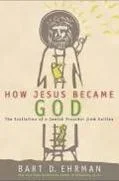You seem to be conflating atoms in the universe with the total number of facts that can be known. The latter is very much greater than the former--indeed, the latter is probably infinite. I think that's probably demonstrable, but the demonstration I have in mind is a bit pedantic. I'll post it if you want, but I think it doesn't really get to the point. Usually when we speak of knowledge we speak of knowing facts that are actually worth knowing, and probably most of the facts that might be known are worthless.
I tend to think that Socrates is probably going to have the last laugh on all of us: human knowledge and wisdom is worth very much less than we usually take them to be worth. I have two master's degrees (one MA and one MS) and a PhD, and I'm continually struck by how very little I know, and how likely it is that what I take myself to know is probably wrong, or only approximately correct. I suspect that's what your interlocutor was trying to impress; I'm afraid I cannot be sure, since I didn't observe the exchange.
But anyway, why should it matter? I think from the perspective of the religious, people with what Peter Unger has called the "Scientiphical Metaphysic" (a term he intended to have roots in both science and philosophy) have constructed what they insist is a complete model of the universe, and often argue as if that model is in principle capable of explaining everything. Not that such explanations are as yet available, but that, with a little luck, they will be eventually, and under this model our representations of the whole universe and every last particle in it will fit together like the pieces of a fantastically large jigsaw. Human reason will have been harmonized utterly with reality, which in turn will be shown to be consistent with our reasoning. And in light of that picture--of the very fact of the existence of that triumphant picture--religions should be abandoned as outmoded and outdated pictures that were attempts at the very same project under which this newer better model was constructed. But religious people see that whole argument as flawed at every step starting with the premises, and while some of them certainly challenge it for insane reasons, some of them challenge it for reasons that strike me as fairly sane.
Again, I'm sure some religious people do try to make that argument (i.e. we don't know, therefore God!). But astute religious people recognize as keenly as you that such an argument is just nonsense. People who are religious have other reasons for being religious. I myself have, and they're not reasons I can really share with anyone. When I point out how little we know, it's not to say that this by itself constitutes proof of God. Rather, it's to show that the attack on religion as sketched above simply cannot succeed. The claims made for how certain is the Scientiphical Metaphysic, and actually how certain it is, are very far apart. Other aspects of the attack are fatally flawed, as far as I can see.
As to those other reasons for being religious, they have apparently little to do with upbringing in the sense of having been brainwashed by fundamentalist parents. Again, some people are in that situation, but most religious people are not. Their upbringing may have shown them something that another kind of upbringing would not have done, but that's rather different from brainwashing. For myself, I think actually very few people in contemporary western culture are capable of being genuinely religious, and if you're not one of those, you shouldn't be. Attempts to convert others are, in this day and age, not only stupid, but at least slightly evil.
I'm sure it seems that way to you. It probably seems just the reverse to a religious person.




